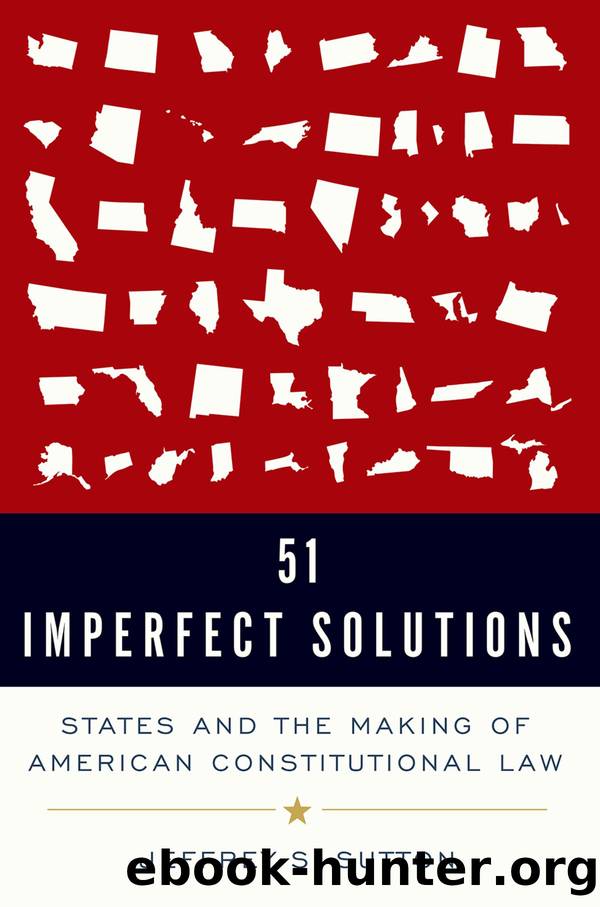51 Imperfect Solutions by Judge Jeffrey S. Sutton

Author:Judge Jeffrey S. Sutton
Language: eng
Format: epub
Publisher: Oxford University Press
Published: 2018-10-15T00:00:00+00:00
While Gobitis undoubtedly accelerated the mistreatment of Witnesses, it would overstate things to conclude that the decision alone caused the problem. Witnesses faced plenty of violence before the decision. In April 1940, just months before the Court handed down Gobitis, one Witness described this incident:
This Mr. Bowman . . . carried this flag in a spear-like position, and he came forward and gave a terrific lunge to plunge me through. I avoided this blow, and as he came by he pushed me into the gutter against an automobile standing there. And he walked by to the corner and offered the flag to a man standing there. . . . And he came back toward me and caught me by the collar and said, âYou son of a bitch.â47
Did these attacks and others deter Witnesses from proselytizing? Apparently not. If anything, the attacks and threats seemed to invigorate them. A yearbook from the period says this:
Daily suffering cruel persecution at the hands of religious fanatics, Jehovahâs Witnesses are not in the least bit discouraged or dismayed. On they joyfully go performing their God-given commission. They know that the persecution which they suffer is indisputable proof that they are the children of God and that nothing can befall them except by the permission of Almighty God and that all things shall work together for the ultimate good of them because they love God and are called according to his purpose.48
At the same time that the attacks did not discourage Witnesses from continuing to proselytize, the attacks did not encourage local law enforcement to deter as many of them as one might have hoped. Some officers did not help at all. When a reporter asked one sheriff why he didnât stop an attack, he answered, âTheyâre traitorsâthe Supreme Court says so. Ainât you heard?â49
From the outset, Gobitis was not a popular decision in the press or the legal academy. One hundred and seventy newspapers editorialized against it, and few favored it.50 The New Republic and the ACLU criticized the decision fiercely, a noteworthy development because Frankfurter, the author of Gobitis, had helped to found both organizations.51 How, they thought, could one of their own, one of the great civil libertarians of the day, the defender of Sacco and Vanzetti, write such a decision?
The director of the ACLU, Roger Baldwin, wrote a letter to Joseph Rutherford, the Witnessesâ leader, promising to help limit or overrule the decision, noting his âshockâ that the Court had swept âaside the traditional right of religious conscience in favor of a compulsory conformity to a patriotic ritual.â52 âThe languageâ of the decision, he added, âreflects something of the intolerant temper of the moment.â53
The New Republic was harder on the Court. It observed that the âcountry is now in the grip of war hysteria,â creating the risk âof adopting Hitlerâs philosophy in the effort to oppose Hitlerâs legions.â54 The magazine even compared the decision to one by a German court punishing Witnesses who refused to honor the Nazi salute, saying
Download
This site does not store any files on its server. We only index and link to content provided by other sites. Please contact the content providers to delete copyright contents if any and email us, we'll remove relevant links or contents immediately.
The Secret History by Donna Tartt(19048)
The Social Justice Warrior Handbook by Lisa De Pasquale(12187)
Thirteen Reasons Why by Jay Asher(8893)
This Is How You Lose Her by Junot Diaz(6877)
Weapons of Math Destruction by Cathy O'Neil(6264)
Zero to One by Peter Thiel(5786)
Beartown by Fredrik Backman(5737)
The Myth of the Strong Leader by Archie Brown(5496)
The Fire Next Time by James Baldwin(5431)
How Democracies Die by Steven Levitsky & Daniel Ziblatt(5213)
Promise Me, Dad by Joe Biden(5141)
Stone's Rules by Roger Stone(5081)
A Higher Loyalty: Truth, Lies, and Leadership by James Comey(4951)
100 Deadly Skills by Clint Emerson(4919)
Rise and Kill First by Ronen Bergman(4778)
Secrecy World by Jake Bernstein(4740)
The David Icke Guide to the Global Conspiracy (and how to end it) by David Icke(4699)
The Farm by Tom Rob Smith(4502)
The Doomsday Machine by Daniel Ellsberg(4484)
